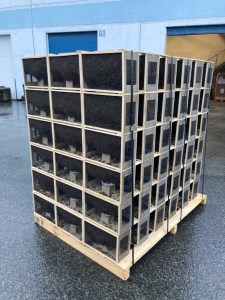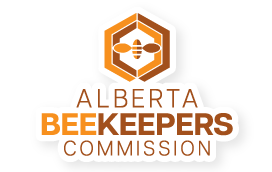Bee import delays puts honey, canola and blueberries at risk
For immediate release
EDMONTON, April 6, 2021 – With the spring farming season close at hand, an irreplaceable agricultural resource is in dangerously low supply.

COVID-related shipping and inspection delays have left Alberta beekeepers far short of the numbers of honeybees they’ll need for 2021. The Alberta Beekeepers Commission (ABC) is calling for urgent action.
“Because of our cold winters in Canada, our beekeepers typically experience significant rates of overwintering loss,” explains Ron Greidanus, Stettler, Alta. beekeeper and ABC Board member. “The Alberta beekeeping industry needs options to import bees if it wants to rebuild and be sustainable. All the options need to be on the table, including California, because it’s so difficult logistically to import from Australia and New Zealand right now.”
Last year, the pandemic made it impossible to import bees. Alberta hive numbers dropped by more than 20,000 in 2020 and contributed to a 30% reduction in honey production.
Spring of 2021 is proving to be the same. This year, 86% of current orders for package bees from current permitted sources are expected not to arrive in Alberta. This makes it impossible for the industry to rebuild.
“We can’t continue to lose hives at this rate, if we want to be sustainable,” says Greidanus. “We are calling for everyone involved in Inspection, Transportation and Customs to work together on solutions. Our window of opportunity is very small and the clock is ticking.”
Alberta is the #1 honey producer in Canada, producing 40 million pounds of honey in a good year. The economic risk of low honeybee hive numbers, however, impacts much more than the province’s 169 commercial beekeepers. Low hive numbers create a costly ripple effect.
Bees also provide pollination for growing hybrid canola seed in southern Alberta. The seed crop itself is worth $1 billion annually. Farmers then plant that seed to grow a commercial canola crop that makes Canada’s $30 billion canola industry possible. The same goes for Canada’s $250 million blueberry crop.
Canola seed grown this year will be planted in 2022. As package bee import numbers have fallen short in recent weeks, canola producers have taken notice.
“It is concerning,” says Ward Toma, General Manager of the Alberta Canola Producers Commission. “With an early arrival to spring this year, anything that delays the deployment of pollinators is very concerning to canola producers, as it could have serious impacts on the supply and cost of canola seed next year.”
Connie Phillips, Executive Director of the Alberta Beekeepers Commission, believes that consultation and cooperation among all parties involved could lessen the damage caused by this year’s bee import delays. Still, time is running out.
“Despite the challenges of COVID, we’re urging government to take action and work together with air transportation agencies and our beekeepers,” says Phillips. “We need a timely solution that will enable the Alberta beekeeping industry to continue to recover and meet industry demand. The next few weeks will determine if we can address the losses that we have incurred over the past two Springs and are experiencing now.”
end.
For more information, please contact:
Connie Phillips
Executive Director
Alberta Beekeepers Commission
connie.phillips@albertabeekeepers.ca
Cell: 780-289-5604
